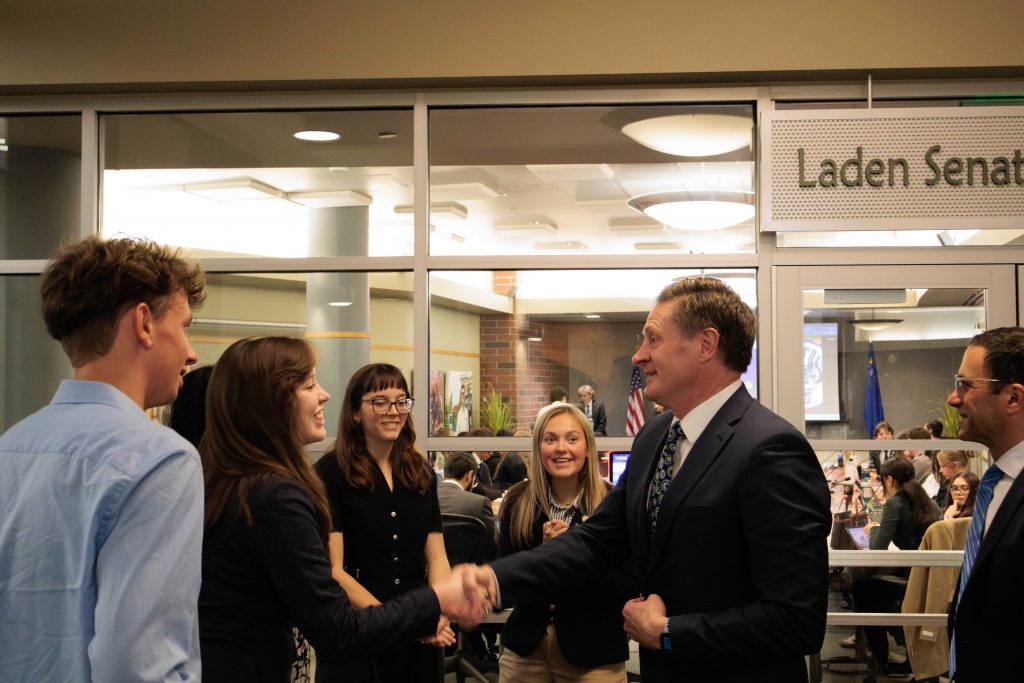The chancellor for the Nevada System of Higher Education (NSHE) visited the Senate of the Associated Students of the University of Nevada (ASUN) to talk about potential increases of tuition and fees across Nevada campuses at their Oct. 15 meeting.
The chancellor is Matt McNair, appointed by the NSHE Board of Regents to serve as the system’s CEO. Accompanying McNair to the senate meeting was NSHE’s CFO Chris Viton.
Viton explained that NSHE has one of the smallest budgets for higher education in the country, and recent inflation and the need to increase faculty pay has resulted in an expanded NSHE budget at a time when the Nevada State Legislature has been reluctant to fund higher education in comparison to K-12 education and Medicaid.
McNair said that more funding from the state was unlikely, especially with declining tourism and the possibility of federal Medicaid cuts that Nevada would have to pick up the financial slack for.
To meet NSHE’s budgetary needs, Viton said that a significant increase in student fees was necessary over the next few years. The general number that NSHE had arrived at was a 12 percent overall increase spread across three years, beginning in fall 2026. The final decision will be made by a Board of Regents vote at their meeting this upcoming December.

When questioned by senators, McNair and Viton clarified that the fee increases would only keep NSHE afloat rather than pay for expanded student services. When asked about whether he thinks the Board of Regents will pass the increases, McNair said he believes so. “It would be hard to tell what would happen to this system if we don’t do this,” he said.
College of Liberal Arts Senator Miriam Dayton asked what students will specifically lose if the fee increase doesn’t pass. McNair said that would be up to each individual institution, but they would generally have less money to work with.
ASUN President Carmina Aglubat jumped in to mention that the university was already intentionally leaving faculty vacancies unfilled due to a tight budget, and this trend would likely continue if UNR’s budget was further reduced.
Speaker Pro Tempore Dillon Moss of the College of Education asked what future plans to avoid budget shortfalls looked like.
McNair said that this was their best guess at a consistent fix, but his predecessors never expected this situation to arise and that other world-changing events like the COVID-19 pandemic could damage the system’s financial stability in the future.
Senator Anna Barrus of the School of Public Health asked about other considered solutions before NSHE proposed the fee increase.
McNair said they were preparing to answer questions specifically about that at the December Board of Regents meeting, and reiterated that NSHE was already “pretty lean,” with one of the smallest operating budgets in the country for higher education.
Legislation
A set of bills was proposed by Senator Alexander Saporito of the College of Liberal Arts that changed the structure of ASUN’s special committees. Saporito is the chair of ASUN’s only current special committee, the Special Committee on Food Insecurity.
The first bill, “S.B. 93 A Bill to Amend the Compensation Structure for Chairs of Special Committees,” would remove the $500 additional stipend received by ASUN senators who serve as the chair of a special committee.
The second bill, “S.B.R. 93 A Binding Resolution to Amend the Duties of and Procedures for Special Committees,” would remove the $500 additional stipend similar to the first bill and remove the ability for a special committee to fulfill an ASUN senator’s requirement to sit on two committees.
Saporito said that this legislation was intended to remove incentives for serving on special committees to ensure that special committee members are there because they want to be. The senate elected to kill the first bill after many senators voiced that special committee chairs still deserved to be paid for their work. The senate resolved to pass future legislation allowing a chair to return their pay to the ASUN general fund if they don’t want it.
The second bill was amended to remove language that prevents a special committee chair from receiving compensation in keeping with the senate’s conclusion about the first bill. They did keep the legislation that prevents participation on a special committee from fulfilling senate requirements to sit on two committees.
The second bill, “S.B.R. 93 A Binding Resolution to Amend the Duties of and Procedures for Special Committees,” passed with a majority vote.
Resignations
Senator Elijah Houghtelling of the School of Public Health resigned, creating another open seat in the senate. The College of Engineering, the College of Business and the School of Journalism also each have one vacancy. This brings the total vacancies in the senate to four.
Riley Overstreet can be reached via email at roverstreet@unr.edu.
